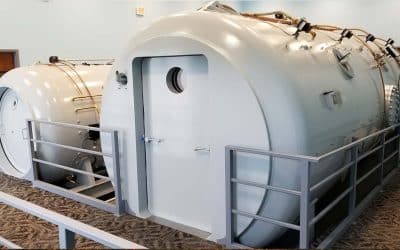Abstract Neuroinflammation is believed to be one of the primary causes of cognitive impairment. Previous studies showed that the antioxidant vitamin C (Vit C) performs many beneficial functions such as immunostimulant and anti-inflammatory actions, but its role in...
Traumatic Brain Injury (TBI)
Hyperbaric Oxygen Therapy (HBOT) Research for Traumatic Brain Injury (TBI).
Clinical and Biochemical Outcomes Following EEG Neurofeedback Training in Traumatic Brain Injury in the Context of Spontaneous Recovery
Abstract It has been found that reduction of posttraumatic stress symptoms is positively associated with the reduction of postconcussive symptoms. Cortisol is commonly used as a biomarker of stress. Understanding the role of posttraumatic stress and cortisol in...
Effect of hyperbaric oxygen therapy on chronic neurocognitive deficits of post-traumatic brain injury patients: retrospective analysis.
The aim of the study is to evaluate the effect of hyperbaric oxygen therapy (HBOT) in participants suffering from chronic neurological deficits due to traumatic brain injury (TBI) of all severities in the largest cohort evaluated so far with objective cognitive function tests and metabolic brain imaging. A retrospective analysis was conducted of 154 patients suffering from chronic neurocognitive damage due to TBI, who had undergone computerised cognitive evaluations pre-HBOT and post-HBOT treatment. The average age was 42.7-14.6 years, and 58.4% were men. All patients had documented TBI 0.3-33 years (mean 4.6-5.8, median 2.75 years) prior to HBOT. HBOT was associated with significant improvement in all of the cognitive domains, with a mean change in global cognitive scores of 4.6-8.5 (p<0.00001).
Evidence brief: hyperbaric oxygen therapy (HBOT) for traumatic brain injury and/or post-traumatic stress disorder.
This report is a product of the VA Evidence-based Synthesis Program. The purpose is to provide “timely and accurate syntheses of targeted healthcare topics. to improve the health and healthcare of Veterans”. The authors have made a comprehensive search and analysis of the literature and make recommendations to assist clinicians in dealing with veterans suffering from either traumatic brain injury (TBI) or post-traumatic stress disorder (PTSD). The report is timely and of great potential impact given the vigorous and lengthy debate among hyperbaric physicians and lay people determined to find an answer for the large numbers of veterans deeply affected with some combination of PTSD and post-concussion dysfunction.
HYPERBARIC OXYGEN THERAPY- BASICS AND NEW APPLICATIONS
Hyperbaric oxygen therapy (HBOT) serves as primary or adjunctive therapy for a diverse range of medical conditions. The indication for HBOT can be related to either pressure (decompression sickness or air emboli) or tissue hypoxia. It is now realized, that the combined action of hyperoxia and hyperbaric pressure, leads to significant improvement in tissue oxygenation while targeting both oxygen and pressure sensitive genes, resulting in improved mitochondrial metabolism with anti-apoptotic and anti-inflammatory effects. Clinical studies published in recent year’s present convincing evidence that HBOT can be the coveted neurotherapeutic method for brain repair. Here we discuss the multi-faceted role of HBOT in wound care in general and in neurotherapeutics in detail.
Beneficial Effect of β-Elemene Alone and in Combination with Hyperbaric Oxygen in Traumatic Brain Injury by Inflammatory Pathway.
Present study evaluates the neuroprotective effect of β-elemene alone and in combination with hyperbaric oxygen (HO) in traumatic brain injury (TBI). TBI was induced by dropping a weight from a specific height. All the animals were separated in to five groups (n=20) like control group; TBI group; β-elemene treated group which receives β-elemene (100 mg/kg, i.p.) half an hour after the injury; HO group which receives hyperbaric oxygen therapy and β-elemene + HO group which receives β-elemene (100 mg/kg, i.p.) half an hour after the injury and hyperbaric oxygen therapy. Neurological function was assessed to evaluate the effect of β-elemene in TBI rats. Thereafter level of inflammatory cytokines and expression of protein of inflammatory pathway was assessed in the brain tissues of TBI rats.
The protection effect and mechanism of hyperbaric oxygen therapy in rat brain with traumatic injury.
To investigate the effect of hyperbaric oxygen therapy (HBOT) on traumatic brain injury (TBI) outcome. The modified Marmarou’s weight drop device was used to generate non-lethal moderate TBI rat model, and further developed in vitro astrocytes culturing system. Then, we analyzed the expression changes of interested genes and protein by quantitative PCR and western blot. Multiple HBO treatments significantly reduced the expression of apoptosis promoting genes, such as c-fos, c-jun, Bax and weakened the activation of Caspase-3 in model rats. On the contrary, HBOT alleviated the decrease of anti-apoptosis gene Bcl-2 and promoted the expression of neurotrophic factors (NTFs), such as NGF, BDNF, GDNF and NT-3 in vivo. As a consequent, the neuropathogenesis was remarkably relied with HBOT.
Case control study: hyperbaric oxygen treatment of mild traumatic brain injury persistent post-concussion syndrome and post-traumatic stress disorder.
Mild traumatic brain injury (TBI) persistent post-concussion syndrome (PPCS) and post-traumatic stress disorder (PTSD) are epidemic in United States Iraq and Afghanistan War veterans. Treatment of the combined diagnoses is limited. The aim of this study is to assess safety, feasibility, and effectiveness of hyperbaric oxygen treatments (HBOT) for mild TBI PPCS and PTSD. Thirty military subjects aged 18-65 with PPCS with or without PTSD and from one or more blast-induced mild-moderate traumatic brain injuries that were a minimum of 1 year old and occurred after 9/11/2001 were studied. The measures included symptom lists, physical exam, neuropsychological and psychological testing on 29 subjects (1 dropout) and SPECT brain imaging pre and post HBOT.
Hyperbaric Oxygen Therapy in the Treatment of Acute Severe Traumatic Brain Injury: a Systematic Review.
There has been no major advancement in a quarter of a century for the treatment of acute severe traumatic brain injury (TBI). This review summarizes 40 years of clinical and pre-clinical research on the treatment of acute TBI with hyperbaric oxygen therapy (HBO2) in the context of an impending National Institute of Neurologic Disorders and Stroke (NINDS)-funded, multicenter, randomized, adaptive Phase II clinical trial – the Hyperbaric Oxygen Brain Injury Treatment (HOBIT) trial. Thirty studies (8 clinical and 22 pre-clinical) that administered HBO2 within 30 days of a TBI were identified from PubMed searches. The pre-clinical studies consistently reported positive treatment effects across a variety of outcome measures with almost no safety concerns, thus providing strong proof-of-concept evidence for treating severe TBI in the acute setting.



